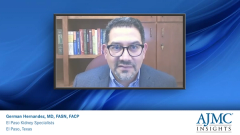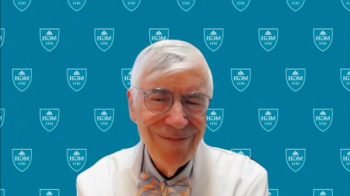
Access to Therapy and Future Treatment Directions in Lupus Nephritis
German Hernandez, MD, FASN, FACP, and Ellen Ginzler, MD, MPH, discuss barriers to treatment access in lupus nephritis, and address future directions and unmet needs of the disease.
Episodes in this series

German Hernandez, MD, FASN, FACP: When treating my patients with lupus nephritis, I have come across some barriers in terms of getting access to treatments. A lot of times, when I prescribe a new drug like Lupkynis, we get quite a bit of pushback from payers requiring more and more information, or requiring that certain steps be met before they will provide coverage for these new medications. The problem is that the longer we wait to achieve a renal response, the higher the chances that the patients progress to worsening kidney disease. It is imperative that everybody understands that for patients with lupus nephritis, time is of the essence. Achieving a renal response is very important. Using new medications can sometimes be challenging for the practicing clinician because there are a lot of barriers put in by payers that prevent us from getting our patients the medications they need.
Ellen Ginzler, MD, MPH: All of these drugs are very expensive, and they all require prior authorization, meaning you have to go to the insurance provider and show evidence that the patient has active disease. You may have to show evidence that the patient has already tried something else. For example, it’s quite interesting that CellCept, or MMF [mycophenolate mofetil], was never approved for lupus nephritis, yet when you try to get one these newer drugs, many insurance providers will say, “You have to show me first that you treated them with CellCept. You have to show me that they didn’t get better with CellCept before I’ll approve either Lupkynis or Benlysta for you.”
That’s a little counterintuitive that they’re saying you need to treat somebody with a drug that wasn’t approved before they’ll let you treat with a drug that was approved. Different insurance carriers have different requirements. Even Medicaid eligibility can be very difficult. I have patients who make a little too much money to qualify for Medicaid, or Medicaid managed care plans, but they can’t afford to pay for private insurance. This can be a real barrier to effective treatment.
German Hernandez, MD, FASN, FACP: In the next 5 years or so, the landscape of treatment for lupus nephritis is going to be quite different than it is now. Obviously, we have 2 newly FDA-approved treatments for lupus nephritis, and there are many ongoing trials looking at monoclonal antibodies for the treatment of lupus nephritis. In the future, while I can’t predict it, my opinion is that we will probably end up with a multitargeted approach to treating lupus nephritis that will incorporate the drugs that are FDA-approved now and potentially others. It’s still an area with a lot of unmet need, considering this is an important disease that mainly affects young women at the prime of their life, yet there are only 2 FDA-approved drugs. That means there’s still more to come, and 5 years from now, the treatment landscape is going to be quite different, with probably more of a multitargeted approach than we have now.
Ellen Ginzler, MD, MPH: There are always going to be new cases of active lupus and active lupus nephritis. I don’t know whether increases in cases have to do with genetics, or whether it’s geographic and it depends on what countries immigrants come from. We know there are genetic predispositions to it, so I think there’s always going to be lupus. There are always going to be new cases of lupus. I don’t think we’re going to wipe out the disease in the next 5 or 10 years. The hope I have is that these biomarkers being studied in the laboratory will help us predict when lupus is active, or help us predict who’s developing lupus, especially family members of people who have already been diagnosed with lupus, so we can diagnose it and identify flares earlier, so we can treat more quickly and get patients under control. While I think there will always new cases of lupus, the hope is that we’ll be able to identify activity and treat it more quickly.
Transcript edited for clarity.
Newsletter
Stay ahead of policy, cost, and value—subscribe to AJMC for expert insights at the intersection of clinical care and health economics.








